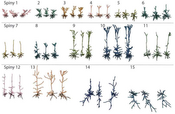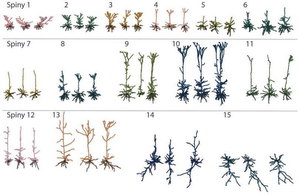Information
- Publication Type: Master Thesis
- Workgroup(s)/Project(s): not specified
- Date: 2024
- TU Wien Library:
- Second Supervisor:
- Astrid Berg
- Katja Bühler
- Open Access: yes
- First Supervisor: Eduard Gröller
- Pages: 134
- Keywords: Graph embedding, Visual Analytics
Abstract
Many deep learning applications are based on graph data in order to explore relationships or to analyze structures. Labeling this data is expensive and often requires expert knowledge. For the application of graph clustering to neuron data, the SOTA method GraphDINO generates self-supervised graph embeddings combined with the downstream task of clustering these embeddings. We observe on a particularly challenging neuron dataset that this method does not lead to satisfying clustering results. Therefore we use the graph embeddings generated by GraphDINO as an initial starting point to improve the network and to guide the network training. To achieve this, we developed the visual analytics framework NetDive. The user can analyze the graph embeddings and label single neurons that are falsely clustered. This annotation information is then used to train a semi-supervised model. To this end, we developed a network architecture, named GraphPAWS, that assembles components of GraphDINO and of the semi-supervised network architecture PAWS. The model training can be started from within the visual analytics application NetDive and the resulting graph embeddings are available in NetDive as soon as the retraining is completed. We demonstrate how we iteratively train the model using NetDive and GraphPAWS and evaluate our model against the self-supervised SOTA for our dataset.Additional Files and Images
Additional images and videos
 teaser:
Example neurons for each spiny clusters of the BBP dataset, with apical
dendrites in lighter color and basal dendrites in darker color.
teaser:
Example neurons for each spiny clusters of the BBP dataset, with apical
dendrites in lighter color and basal dendrites in darker color.
Additional files
Weblinks
BibTeX
@mastersthesis{pichler-2024-vaf,
title = "Visual Analytics f\"{u}r Deep Learning mit Graphen: Case
Study Neuronen Clustering",
author = "Marie-Sophie Pichler",
year = "2024",
abstract = "Many deep learning applications are based on graph data in
order to explore relationships or to analyze structures.
Labeling this data is expensive and often requires expert
knowledge. For the application of graph clustering to neuron
data, the SOTA method GraphDINO generates self-supervised
graph embeddings combined with the downstream task of
clustering these embeddings. We observe on a particularly
challenging neuron dataset that this method does not lead to
satisfying clustering results. Therefore we use the graph
embeddings generated by GraphDINO as an initial starting
point to improve the network and to guide the network
training. To achieve this, we developed the visual analytics
framework NetDive. The user can analyze the graph embeddings
and label single neurons that are falsely clustered. This
annotation information is then used to train a
semi-supervised model. To this end, we developed a network
architecture, named GraphPAWS, that assembles components of
GraphDINO and of the semi-supervised network architecture
PAWS. The model training can be started from within the
visual analytics application NetDive and the resulting graph
embeddings are available in NetDive as soon as the
retraining is completed. We demonstrate how we iteratively
train the model using NetDive and GraphPAWS and evaluate our
model against the self-supervised SOTA for our dataset.",
pages = "134",
address = "Favoritenstrasse 9-11/E193-02, A-1040 Vienna, Austria",
school = "Research Unit of Computer Graphics, Institute of Visual
Computing and Human-Centered Technology, Faculty of
Informatics, TU Wien",
keywords = "Graph embedding, Visual Analytics",
URL = "https://www.cg.tuwien.ac.at/research/publications/2024/pichler-2024-vaf/",
}

 thesis
thesis
